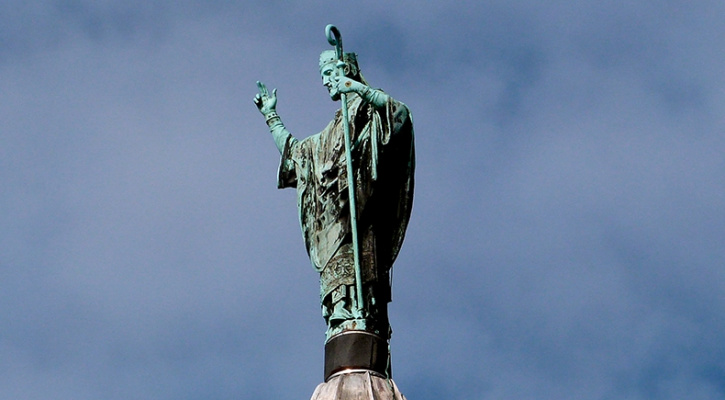Saint Martin of Tours, Saint of the day for 11 November

Saint of the day for 11 November
(c. 316 - November 8, 397)
History of Saint Martin of Tours
A conscientious objector who wanted to be a monk; a monk who has been maneuvered to become a bishop; a bishop who fought against paganism and implored mercy from heretics: such was Martin of Tours, one of the most popular saints and one of the first not to be a martyr.
Born to pagan parents in present-day Hungary and raised in Italy, this veteran's son was forced to serve in the army at the age of 15. Martin became a Christian catechumen and was baptized when he was 18. It was said that he lived more like a monk than a soldier. At 23, he turned down a war bonus and told his commander: “I served you as a soldier; now let me serve Christ. Give the reward to those who fight. But I am a soldier of Christ and I am not allowed to fight “. After great difficulties, he was discharged and went to be a disciple of Hilary of Poitiers.
He was ordained an exorcist and worked with great zeal against the Aryans. Martino became a monk, living first in Milan and then on a small island. When Hilary was brought back to his see after his exile, Martin returned to France and founded what may have been the first French monastery near Poitiers. He lived there for 10 years, training his disciples and preaching throughout the countryside.
The people of Tours demanded that he become their bishop. Martin was lured to that city by a ruse - the need for a sick person - and was taken to church, where he reluctantly allowed himself to be consecrated bishop. Some of the consecrating bishops thought his shaggy appearance and tousled hair indicated he was not decent enough for the office.
Along with St. Ambrose, Martin rejected Bishop Ithacius' principle of putting heretics to death, as well as the emperor's intrusion into such matters. He convinced the emperor to spare the life of the heretic Priscillian. For his efforts, Martin was accused of the same heresy and Priscillian was executed after all. Martin then called for an end to the persecution of Priscillian's followers in Spain. He still felt he could collaborate with Ithacius in other areas, but his conscience later troubled him over this decision.
As death approached, Martin's followers begged him not to leave them. He prayed, “Lord, if your people still need me, I don't refuse the job. Your will be done. "
Reflection
Martin's concern for cooperation with evil reminds us that almost nothing is all black or all white. Saints are not creatures from another world: they face the same puzzling decisions that we do. Every conscientious decision always involves some risk. If we choose to go north, we may never know what would happen if we went east, west or south. A hyper-cautious withdrawal from all bewildering situations is not the virtue of prudence; it is in fact a bad decision, because “not to decide is to decide”.